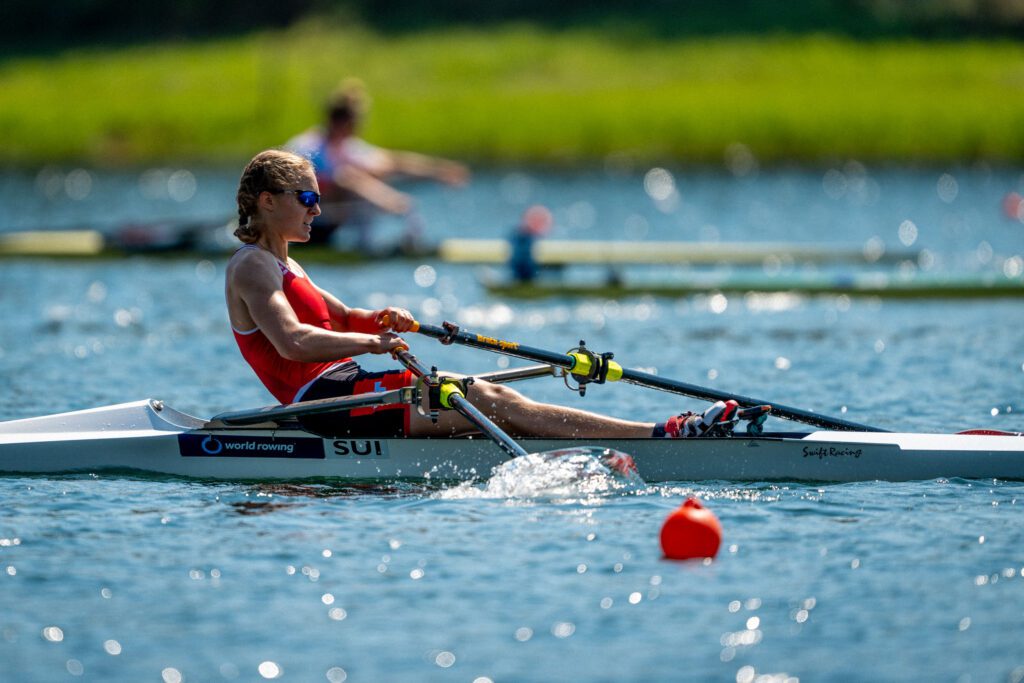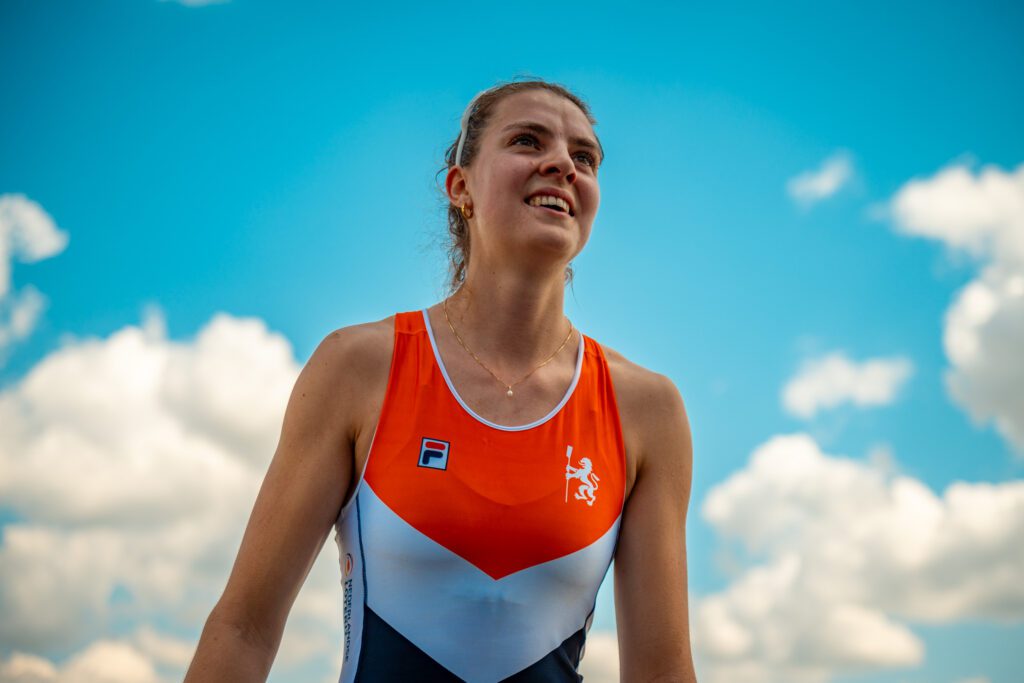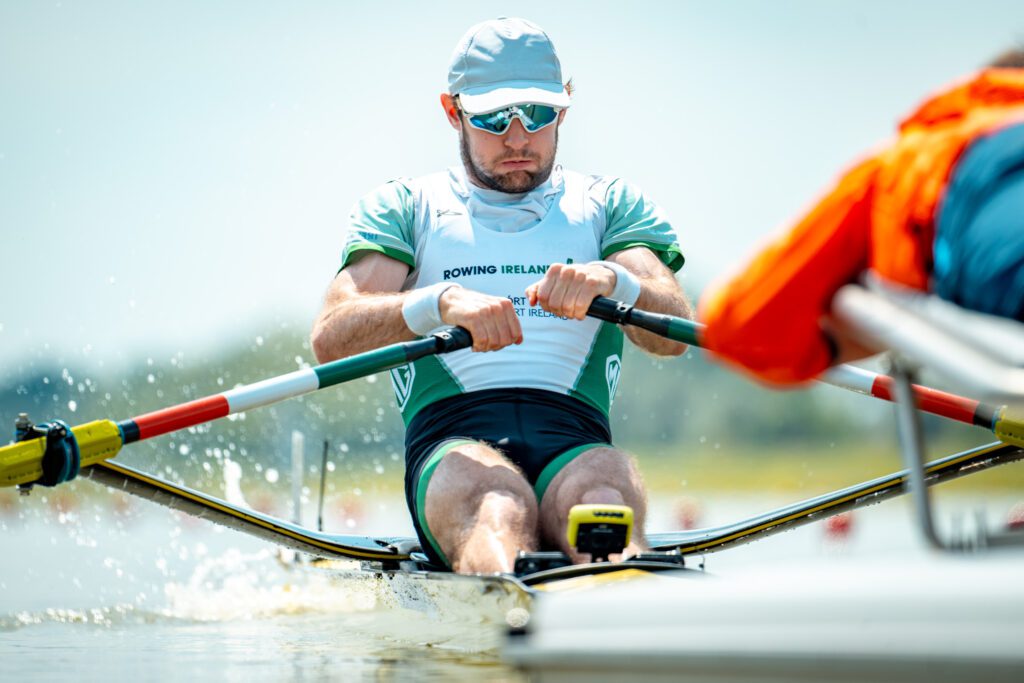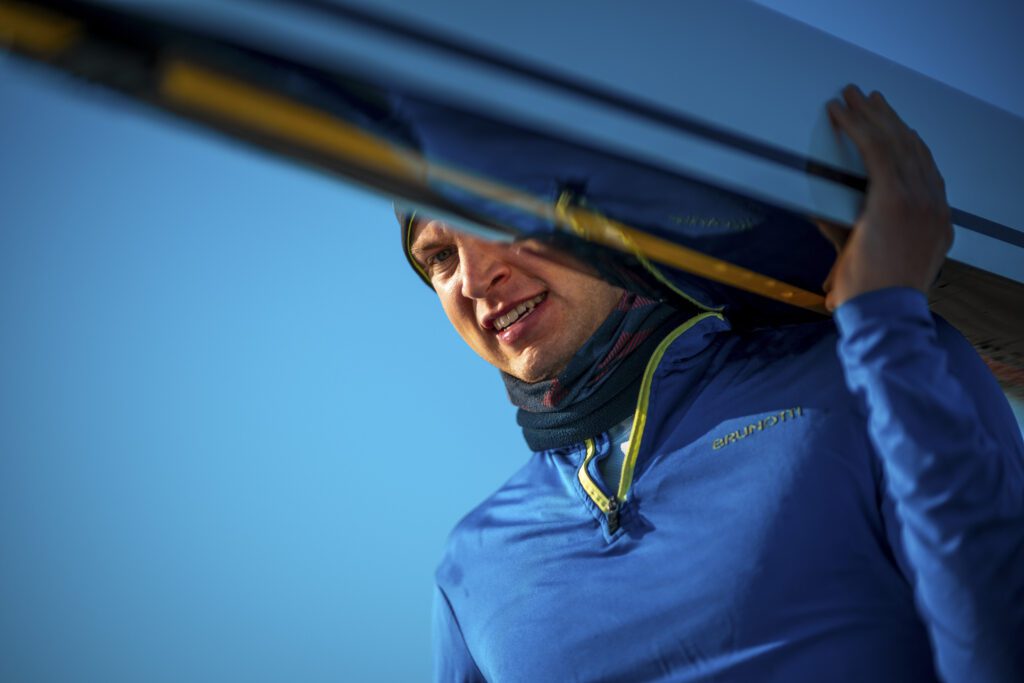As the sun soared into the Hungarian sky over miles of rolling flat cropland, day four at Szeged saw the wind continue to circle round the lake, adding a dash of tailwind near the finish to a vicious cross-head along most of the course, then swirling around the grandstand into a wind vortex. The lanes were redrawn for the cross-headwind (again) and by the time the finals got going was stronger than the earlier days. Races became longer, margins stretched almost to breaking point: by halfway if you got ahead, you were highly likely to win.
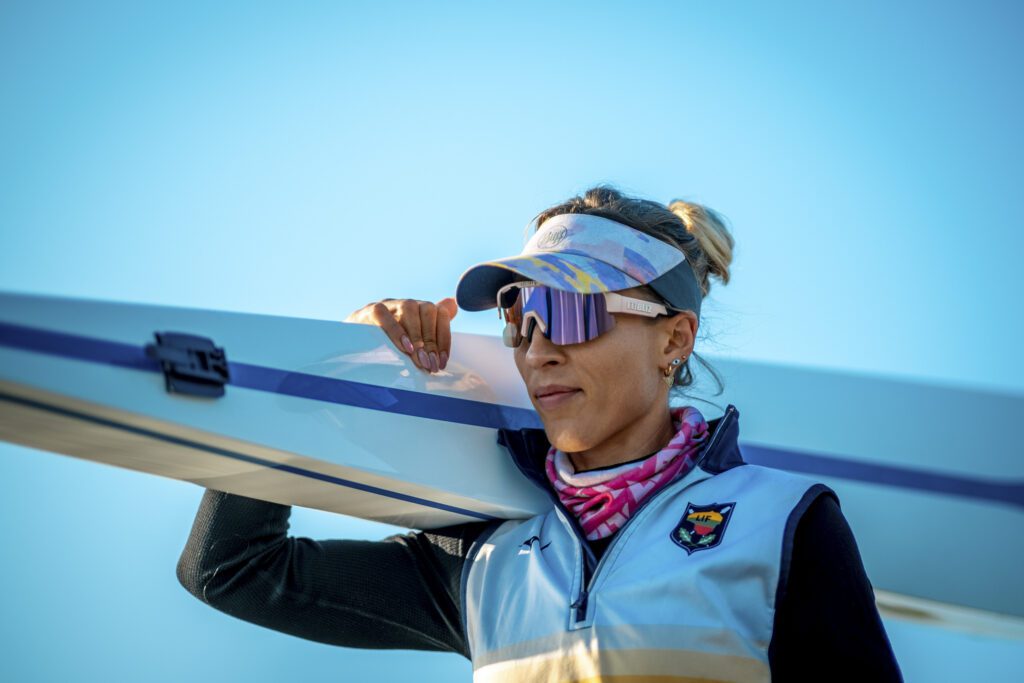
Photo LTU W2x
Credit Benedict Tufnell
This was evident in two men’s sweep match-ups, where perennial men’s pairs rivals Britain against Switzerland, and this season’s big M4- hitters Italy against Britain, raced in lanes one and two. In both cases the British won, but in very different contexts. In the pairs although Switzerland initially stalked the British with canny caution, the Swiss found themselves unable to prevent Romania hauling past them.
At halfway there was clear daylight between leaders GBR and the rest, but this closed up quickly as the sprints began. The field was closed on by Martin and Valent Sinkovic (CRO) who raised the rate as if the devil was behind them, but couldn’t quite erode the big gap, while Romania tried fruitlessly to battle both the wind and the British, and ended up rowing very short to ensure their silver behind the British gold and pushing Switzerland into bronze. It wasn’t pretty, but was urgent, and a close contest between all three which promises to be revived soon in Lucerne.
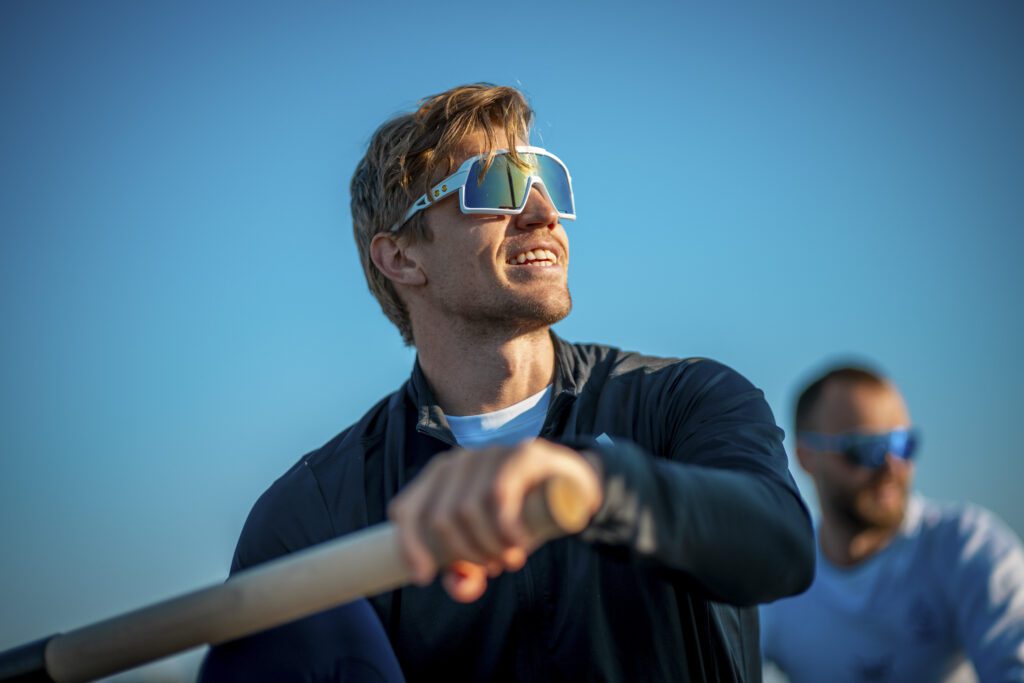
Photo GBR M2-
Credit Benedict Tufnell
The men’s fours also went to the British, who were dead-set on proving Italy’s gold in Varese was a one-off. That they managed it was partly better crew focus, partly the best lane in nasty wind, and partly, it has to be said, the fact that with qualification still needed Italy aren’t on quite the same training cycle. The gap between them finished at a length, with France about the same distance back on Italy for bronze, but nobody would bet against the Italians now to get one of the last two Paris slots in May. “Any chance of a race is pretty beneficial, to put us under pressure and see how good’s your rhythm, how good’s your mental side,” said Matt Aldridge (GBR). “We know the Italians are really good, they beat us twice in the last world cup,” said David Ambler, “and there’s more really good crews to come in, we know that.”
As massive non-para margins go the lightweight men’s single was the biggest, 13 seconds separating gold medallist Niels Torre (ITA) from Marlon Colpaert (BEL), and looking to spectators more like half a mile. The women’s lightweight singles nearly matched that, Individual Neutral Athlete Alena Furman taking 750m to get to the front but then simply extending her lead to nearly 11 seconds, well ahead of Ireland’s Margaret Cremen.

Photo GER W8+
Credit Benedict Tufnell
Two races earlier Cremen’s teammate Paul O’Donovan (a world and Olympic champion in the LM2x) had spooked several openweight scullers by finishing second in the M1x B-final, eighth overall. And that in a fierce headwind while O’Donovan, racing here as an openweight while his crewmate Fintan McCarthy recovers from illness, is still at ~72.5kg while training to defend his Tokyo LM2x title. O’Donovan has already spoken to Irish media about going heavyweight after Paris when the lightweight events are abolished, and after this start he could be a frightening opponent when he puts on more muscle.
All Row360 coverage of the racing at Szeged, Hungary
The A-final of the men’s singles went according to expectations in the conditions. Greece’s Tokyo champion and slightly built Stefanos Ntouskos had a go but knew that the wind and Olli Zeidler’s massive German muscles were likely to defeat him, as indeed they did, Zeidler swishing past Ntouskos not long before 1000m to clinch gold. Ntouskos has been battling some injuries this winter but says they are behind him now. Behind the two of them LTU’s Giedrius Bieliauskas sprang a cracker of a surprise on Sverri Nielsen, passing the third-placed Dane in the last 250m to claim bronze.
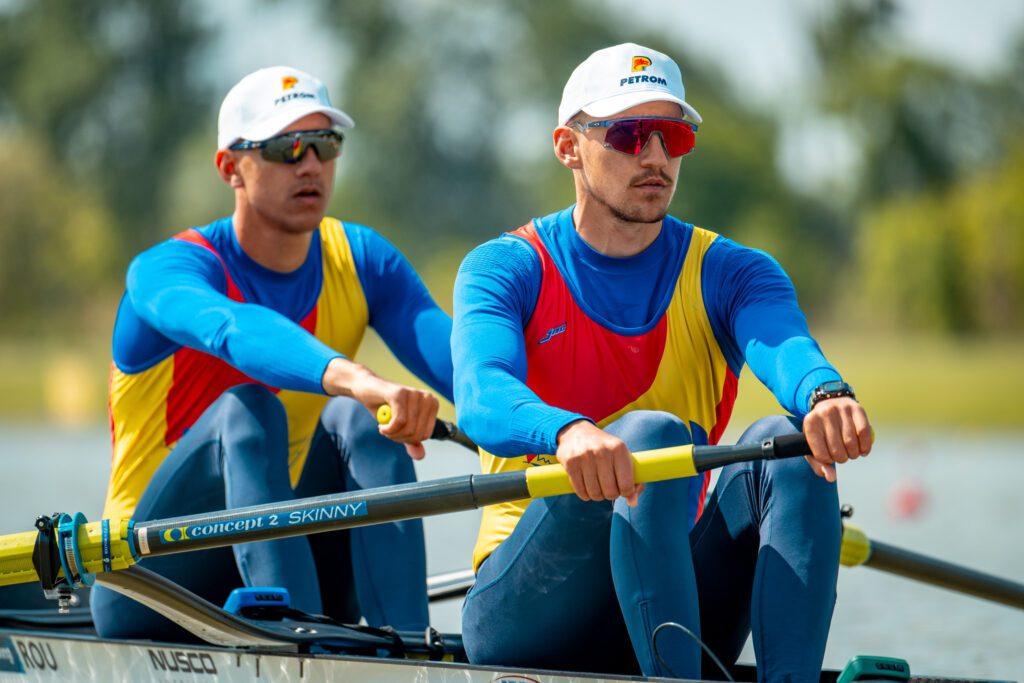
Photo ROU M2-
Credit Benedict Tufnell
The women’s singles were a much more open field due to the absence of Karolien Florijn (NED), and the opportunity was seized with glee by Jovana Arsic, who led all the way to win Serbia’s first ever women’s gold medal in delight and style, especially after being ill during the winter and having training disrupted by her national federation’s argument with World Rowing. Behind her Alexandra Foester (GER) was never challenged as runner-up, but Czechia’s Alice Prokesova raced superbly to get through a four-way battle and grab bronze, barely believing her own success, especially as she had been trailing last by a couple of seconds at halfway.
The para-rowing championship races were dominated by Britain, who walked off with both Sunday’s titles, their defending Paralympic title-holder crews each fielding a newcomer who has slotted in effortlessly. Gregg Stevenson, the most cheerful person in rowing, was full of beans as he celebrated his first title defence in the PR2 Mx2x with Lauren Rowles, and Joshua O’Brien seems made for the two-seat of the PR3 Mix4+ despite a long and arduous race. There was more personal storytelling in the mix zone today as double Paralympic champion Rowles dedicated the win to her partner Jude and their five-week-old son Noah.
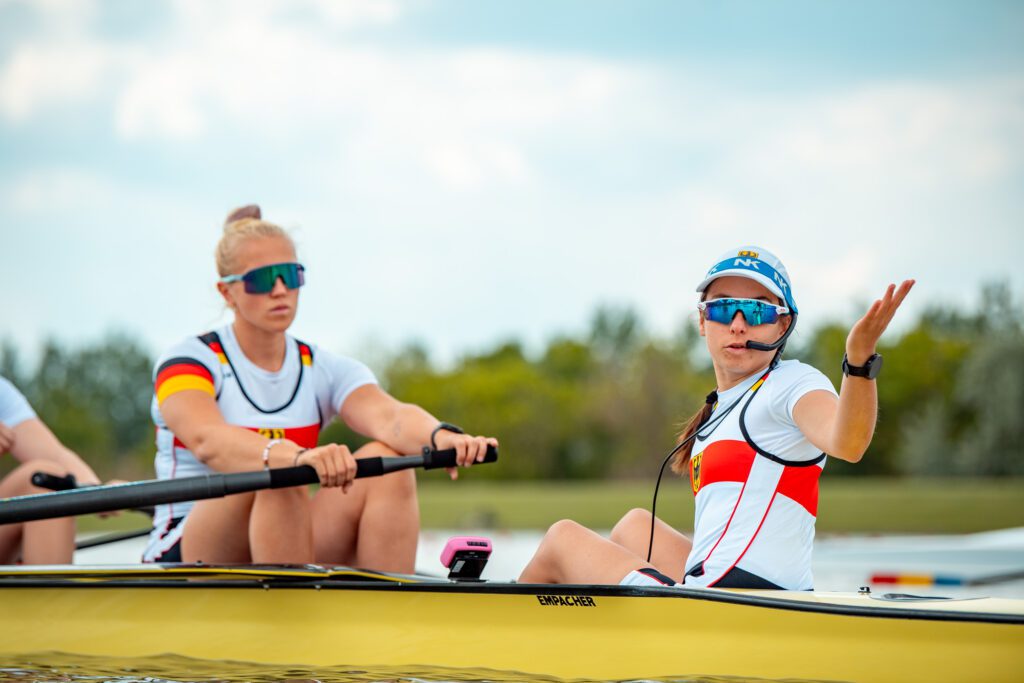
Photo GER W8+
Credit Benedict Tufnell
France captured the silver in the para-fours behind the boringly expert British, well ahead of Italy and a very distant Spain. But in the para-doubles Germany’s Paul Umbach and his new coastal-rower partner Jasmina Bier gave France a hell of a shock by storming through from the worst possible lane to grab silver. That encouraged Ukraine to follow suit and an unhappy French double struggled over the line in fourth after their initial fast start. Germany must now be odds on to take one of the last two Paris tickets in this event.
The world of the openweight doubles gave some of the bigger surprises this time, one of the closest races of the day a mighty dingdong between Lithuania and Norway’s completely new combinations which ended with the Norwegians only two seconds in front. Two seconds was more like two inches in the conditions at the time, but both crews are clearly ones to watch. “You know it’s Olympic season, we want to get on the podium in Paris, we thought we’d better get on the podium here in Hungary,” Norway explained cheerfully afterwards. “I don’t know if it was realistic, but coming into our first race, we thought we’d’ give it a shot.” Romania mopped up the bronze behind them, but in the men’s doubles final a race later teammates Andrei-Sebastian Cornea and Marian Enache (ROU) set a pace nobody else could live up to.
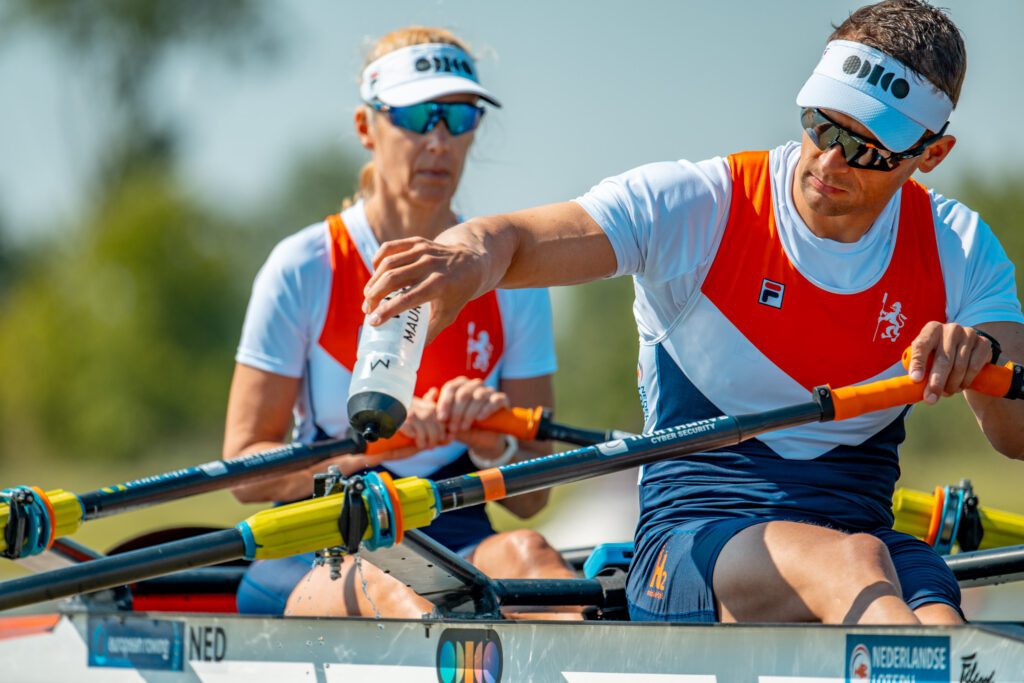
Photo NED PR2 Mix2x
Credit Benedict Tufnell
For a few minutes it looked as if the race was over, Germany blessing their lane and staying well clear of Spain while the rest strung out in a long tail. But then it suddenly got interesting, Spain’s Aleix Garcia I Pujolar and Rodrigo Conde Romero overcoming the wind and launching themselves like rockets at second place. Their attack blasted Germany’s double to bits, leaving the Spanish themselves looking wrung out when they came ashore, but it was a memorable silver medal reminiscent of their 2022 world championships result.
The day was rounded off by Romania’s win in the women’s eights, adding to a similar success in the women’s pairs earlier on which resumed normal service in the world of female sweep rowing, to nobody’s surprise. Don’t forget that Romania have been winning women’s sweep medals for forty years, several times capturing all three categories at the Olympics plus the odd sculling victory. The pair had it all their own way, determined to show they should have been missed in Varese, while a tight race for the minor medals saw Greece fight off Croatia who themselves had to fend off Czechia and Britain to yield their first ever senior medal and put themselves on the road to qualification and possibly making Croatian women’s rowing history in Paris.
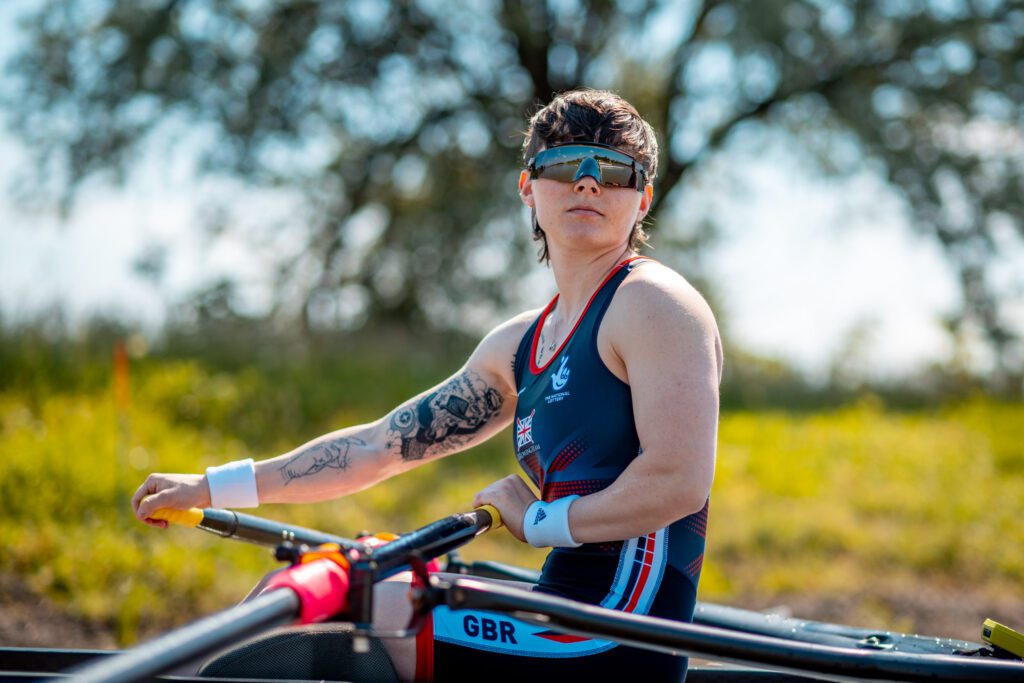
Photo GBR PR2 Mix2x
Credit Benedict Tufnell
The legendary Romanian oarswomen who took the early victories, often doubling up to do it, are now running their national sport, but their successors are ready to show the new generation can match the achievement. The Italian and British eights had no real chance of going for gold this time, and now part ways, Italy off to try and qualify for Paris in Lucerne, and Britain hoping to show a new turn of speed against a likely strong field in the Rotsee world cup a few days later. Romania will be wondering what the Americans have up their substantial sleeves.
